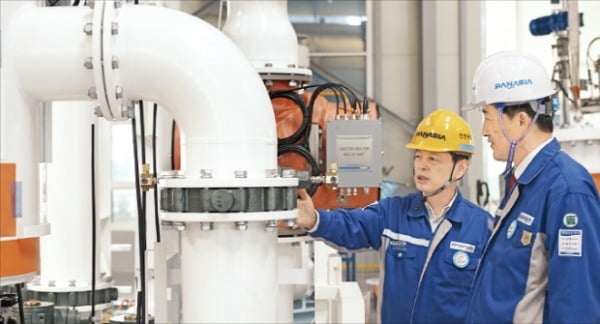- This is PANASIA
- ESG Management
- History
- Smart PANASIA
- Contact information
 About
About
Check PANASIA introduction,
ESG management, and History
information
- Energy Solutions
- Air Solutions
- Water Solutions
 Eco-friendly Solution
Eco-friendly Solution
About Global environmental
regulation, Hydrogen business,
Air quality, and Water quality
environment solutions
- Product Service
- Service Network
- Customer Service
 Customer Support
Customer Support
Check the Panasia’s
after service
- About
- Eco-friendly Solution
- Customer Support
- Media
NEWS

PANASIA Develops Eco-Friendly Ship Equipment…’4 First Business’
Shines Amid Crisis

PANASIA CEO Lee Soo-tae (right) discussing product exports post Covid-19 in the plant at Busan Mieum Industrial Complex.
Provided by PANASIA
“Our 4 First business strategy ‘See First; Do First; Strike First; Occupy First’ shall lead us to overcome Covid-19 and
secure an unrivaled position in the domestic and overseas market”
Lee Soo-tae, CEO of the marine equipment supplier, PANASIA, noted in his interview with the Korea Economic Daily on
the 24th that PANASIA’s driving force for its quantum leap is the ‘4 First’ business’” and stressed that they are “still
committed to technology development while bracing for the export market crisis caused by the unprecedented Covid-19.”
The 4 First Business formulated by the president Lee is to ‘See First’ which refers to creating a perspective to predict
attractive businesses by obtaining information and reading books; and ‘Do First’ which refers to taking the first step in
technology development by investing in R & D. Only in this way can one ‘Strike First’ and takeover the market when it
approaches and as a result ‘Occupy First’ an unrivalled position in the market.
PANASIA’s success has been built on this philosophy. While most marine equipment suppliers were focused on
production and shipment of existing equipment, he had a vision that reducing air pollution of ships would create new
growth engines for the future. He leaped into developing eco-friendly parts starting with the de-SOx device in July 2012
and completed its basic design in December 2013. The first de-SOx device launched in 2014, and by 2018 the third
generation had been developed.
While the European businesses held a firm grip on the market for de-SOx devices, PANASIA developed its own
technology and gained respect in the global market. It received recognition for developing its own technology and was
awarded the IR52 Jang Young Sil Award by the Korea Evaluation Institute of Industrial Technology. Despite the long-term
recession in the ship industry, it boldly invested in the ‘Smart Factory’ and was able to smoothly ease into the orders
pouring in after 2018.
R & D and investment into its workforce has made PANASIA be where it is today. Despite the severe long-term
economic crisis in the ship industry, president Lee imposed an ‘asymmetrical strategy.’ The harder the times, the more
he invested into technology development. As a result, it was always a step ahead of its competitors in development,
and took over the market.
PANASIA holds a firm philosophy in securing talent by training future talents in Busan. President Lee said that “investing
in talents in the ship industry in Busan, has made key technology development possible” and added that the company
will “continue to search for talented people within the region and grow together.”
Despite the economic crisis in the ship industry, PANASIA’s eco-friendly ship products such as de-SOx equipment for
ships, increased in exports last year by 497% compared to the previous year. Owing to this, in 2019 its ballast water
management system was top 2 in the global market share, and its de-SOx scrubber system was top 1 in global market
share; it received the 2019 Busan Export Award 100-million-dollar Export Tower Award and was honoured with the 125th
Korea’s Trader of the Month Award.
President Lee received recognition in the ‘marine sector’ during the 21st Busan Culture Awards held in the auditorium on
the 2nd floor of the headquarters of Busan Bank. Busan Culture Awards honors outstanding individuals or groups in the
marine, volunteer, business, culture/arts sector. Lee was acknowledged for his contribution to the development of the
local economy through technology and for using its technology-centered business to lead in protecting the air and
ocean environment. In 1989, when Korean-made marine equipment were still quite uncommon, the company started as
Beom-A Precision Engineering with the goal to localize measurement systems for ships, and was later praised for
developing eco-friendly equipment in preparation for environmental restrictions imposed by the International Maritime
Organization, and for pioneering the marine equipment global market.
President Lee, said “we have put every effort into developing eco-friendly marine equipment despite the economic crisis
in the marine industry, and are now confident that even in a traditional industry sector, proper development of
technology can increase sales and jobs” and stressed that he “will further expand his search for new eco-friendly
businesses.”










